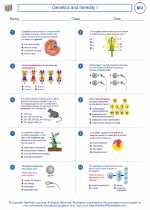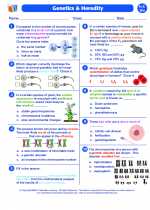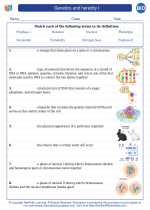Appreciation in Biology
Appreciation in biology refers to the understanding and recognition of the intricate and diverse aspects of the living world. It involves recognizing the beauty, complexity, and interconnectedness of organisms, ecosystems, and the natural world as a whole.
Why is Appreciation Important in Biology?
Appreciation is important in biology because it fosters a deeper connection and understanding of the natural world. It encourages individuals to value and respect the environment, biodiversity, and the delicate balance of ecosystems. When students appreciate the wonders of biology, they are more likely to become environmentally conscious and develop a sense of responsibility towards preserving and protecting the natural world.
Study Guide for Appreciation in Biology
- Understanding Biodiversity: Learn about the immense variety of organisms, from microscopic bacteria to complex animals and plants. Understand the importance of each species in maintaining ecological balance.
- Ecological Interactions: Explore the intricate relationships between different species, such as predator-prey interactions, mutualism, and commensalism. Understand how these interactions contribute to the stability of ecosystems.
- Environmental Awareness: Study the impact of human activities on the environment, including pollution, deforestation, and climate change. Recognize the importance of conservation and sustainable practices.
- Field Trips and Observations: Take part in field trips to natural habitats, botanical gardens, or wildlife reserves to observe and appreciate the diversity of life firsthand.
- Case Studies: Analyze real-life examples of conservation efforts, species restoration, and environmental protection initiatives to understand the significance of these actions.
- Visual Aids and Multimedia: Use diagrams, videos, and interactive learning tools to visually appreciate the complexity of biological concepts, such as cellular processes, genetic diversity, and ecological pyramids.
By embracing appreciation in biology, students can develop a profound respect for the natural world and gain a deeper understanding of the interconnectedness of all living organisms.
.◂Biology Worksheets and Study Guides High School. Genetics and heredity I

 Worksheet/Answer key
Worksheet/Answer key
 Worksheet/Answer key
Worksheet/Answer key
 Worksheet/Answer key
Worksheet/Answer key
 Vocabulary/Answer key
Vocabulary/Answer key
 Vocabulary/Answer key
Vocabulary/Answer key
 Vocabulary/Answer key
Vocabulary/Answer key
 Vocabulary/Answer key
Vocabulary/Answer key
 Vocabulary/Answer key
Vocabulary/Answer key
 Vocabulary/Answer key
Vocabulary/Answer key
 Vocabulary/Answer key
Vocabulary/Answer key
